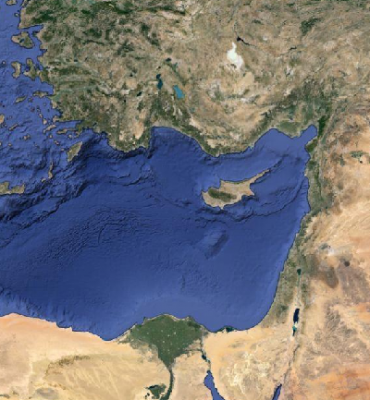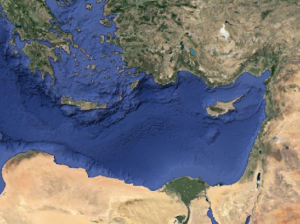
Geopolitics of Energy in the Eastern Mediterranean – German Marshall Fund Panel Talk
On February 11th, 2014, I observed a panel event hosted by the German Marshall Fund entitled “Geopolitics of Energy in the Eastern Mediterranean.” The hydrocarbon reserves discovered in the region presents many opportunities yet also challenges for the nations of Israel, Cyprus, and others in the region. The speakers were Anastasios Giamouridis, senior consultant, Pöyry Management Consulting, Simon Henderson, director, Gulf and Energy Policy Program, The Washington Institute, and Eric V. Thompson, vice president and director of CNA Strategic Studies. The talk spanned a large spectrum of topics relevant to the Eastern Mediterranean.
Congressmen Sarbanes, Bilirakis, Deutch, members of the Congressional Hellenic Israel Alliance, and Congressman Turner, were present at the discussion. Each gave remarks at the onset. All four Representatives saw these developments as pertinent to the United States, potentially stabilizing a volatile area while strengthening ties to allies who “share our values,” which “ultimately helps the United States.”
Neil Brown, fellow of the GMF and moderator of the discussion, posited four potential broad outcomes from their development. In the category of “really bad,” the newly found energy sources could encourage conflict in the area. Animosities between Turkey, and Israel and Cyprus could become more flagrant, perhaps even outright hostile. A “sort of bad” result entails entrenchment of current divisions. Rivalries would not be exacerbated, but instead the new found energy sources make any future reconciliation even tougher. A “sort of good” product would foster and promote cooperation between the various nations despite continued disagreements. Most optimistically, the “really good” scenario would fuel a complete breakthrough solving the conflicts and disputes between the countries.
Mr. Brown’s first questions to the panel were how much gas is in the reserves, how soon can it be extracted, and what is its impact? Mr. Henderson replied that the reserves are not big in “world terms” but big in “Eastern Med.” terms. Current estimates say it is less than but could possibly rival Egypt’s reserves. He explained that difficulties in developing and processing the natural gas reserves were greater than the present opportunities, but that Israel had, right now, enough commercially accessible and found reserves to export. The big question is where and how to export it. By 2015, the Israelis expect the off shore natural gas reserves will supply 50% of their energy needs. As for the Cypriot reserves, “there are commercial opportunities, but not as large as we’d like them to be.”
There was discord among the panelists on where was the optimal place to export natural gas. Mr. Henderson believed Turkey is the most logical destination for Israeli gas, “if you leave out politics.” He says he still expects for Israel to pursue this path, irrespective of Cypriot protests. Mr. Giamouridis disagreed, stating that during these early stages, it is “premature to say the Turkish option is the best”. To illustrate his point, he explained that the Russian energy company Gazprom, the number one supplier to Turkey, has shifted its strategy to protect its position in various markets through various means, including offering lower prices. More research, according to Mr. Giamouridis, is necessary.
An interesting paradox was brought up. If the United States were to approve exporting domestic natural gas, it would directly harm the ability for Eastern Mediterranean LNG to find a market in Europe. These two individual events are individually seen as promoting American interests and security. However, when pursued in conjunction, they undermine each’s unique goals and may ultimately result in a position worst off than if neither pursuit was followed.
Unsurprisingly, Turkey’s long shadow over the Eastern Med took up a large part of the discussion. Mr. Thompson maintained that Turkey’s “Either or” policy, where investors must choose between Cyprus or Turkey, is unfortunate and divisive. It is important that the US and other groups help Turkey think differently and move to a “zero problem foreign policy.” They said Turkey pays a high cost for not having good relations with its neighbors. Mr. Giamouridis also pointed out examples of Turkish intransigence, repeating the statement by the Turkish Foreign Minister warning businesses not to invest in Cyprus or risk being unable to invest in Turkey. However, he does not think the political risk is too high as there were bids from many companies from the U.S., E.U., Russia, and Australia. “The political risk is there, but not big enough” to affect companies’ decision making. Mr. Giamouridis, unlike the other panelists, did not believe cooperation with Turkey is an absolute necessity.
Mr. Giamouridis pointed out a core question: “can the United States allow a U.S. company not to invest in a commercially viable area because a third party says no?”
Mr. Henderson believed that the mere fact that Noble Energy is an American company has restrained Turkey’s behavior from being even worst molestation and rash aggravations.
Mr. Thompson said the United States can play a big role in calming the situation with better communication, claiming it is an opportunity to reset terms and discussion. Emphasis should be on promoting what is best for everyone, not just about aggrandizing pride. The U.S. should also communicate more clearly that the U.S. stands by its support and alliance with the nations and will always continue to do so, and, importantly, that the “pivot” is not a abandonment of a commitment in the area but instead designed to allow better American responses to crises around the world. Mr. Thompson ended the discussion pointing out that there is more US activity in the Mediterranean now than there has been in decades.







[…] Geopolitics of Energy in the Eastern Mediterranean – German Marshall Fund Panel Talk […]